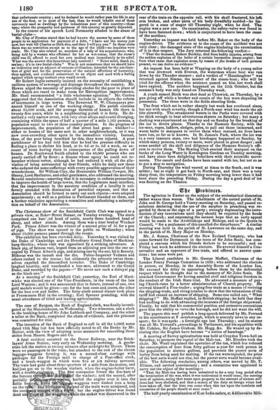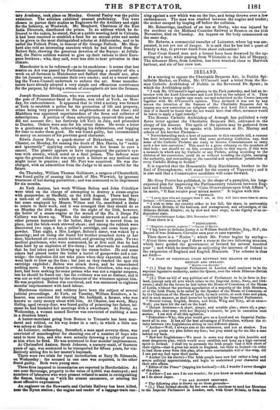Vbe Vrobintes.
The agitation in Exeter on the subject of the ecclesiastical dissension rather waxes than wanes. The inhabitants of the united parish of St. John and St. George held a Vestry-meeting on Saturday, and passed re- solutions declaring that the use of the surplice in preaching was re- garded by them as the sign of a party ; strongly deprecating the intro- duction of any innovations until they should be required by the heads of the Church ; and expressing the earnest hope that an early appeal would be made to the Archbishops and Bishops, and to the Queen in Council, " for a settlement of this uncalled-for disturbance." A similar meeting was held in the parish of St. Lawrence on the same day, and in the parish of St. Mary Major on Monday.
Mr. J. Somes, Chairman of the New Zealand Company, who has come forward for Dartmouth in the room of Sir John Seale, has com- pleted a canvass which his friends declare to be successful ; and on Friday last week he addressed the electors. He avowed himself a Con- servative and an opponent of free trade, and offered to answer ques- tions ; but none were put.
The Liberal candidate is Mr. George Moffatt, Chairman of the London Penny Postage Committee in 1838 ; who addressed the electors in person, on Monday, in the Assembly Room of the London Inn. He excused his delay in appearing before them by the deferential respect which he thought due to the memory of Sir John Seale. He attacked Government for having assailed civil and religious freedom in the conduct of the Irish State trial. He advocated a measure of pay- ing Church-rates by a better administration of Church property. He avowed himself a Free-trader ; urging free trade as a means cf reviving the shipping-trade, and citing returns to show that the relaxations of the tariff had caused an increase of shipping. Some one called out, " What shipping ? " Mr. Moffatt replied, in British shipping: he held that they had nothing to do with advancing the interests of the foreign shipowner. Finally, he said that his commercial position and extensive connexions gave him the ability to -erve the borough, and he did not want the will.
The papers this weel publish a long speech delivered by Mr. Ferrand to his constituents at F taresborough, which is scarcely news in any re- spect ; for it was spokt a fortnight ago last Thursday ; and its matter was all Mr. Ferrand's eroceedings in Parliament, and his squabbles with Mr. Cobden, Sir James Graham, Mr. Hogg, &c. He wound up by de- claring that the English have become " a nation of humbugs."
A meeting of Surrey agriculturists was held at Croydon Town-hall on Saturday, to promote the repeal of the Malt-tax. Mr. Bleaden took the chair. Mr. Weall explained the operation of the tax, which has reduced the consumption of beer from forty gallons a-year for each person in the population to sixteen gallons, and prevents the poorer sorts of barley from being used for malting. If the tax were repealed, the price of the best sorts would not rise, but the poorer sorts would become avail- able. The following resolution, among others, was moved by Mr. T. Ellman, and carried unanimously ; and a committee was appointed to carry out the object of the meeting- " That the Malt-tax having been submitted to for a very long period after the termination of the war, when it was understood it would cease, the meeting were of opinion, seeirv, that taxes upon property to the amount of sixteen mil- lions had been abolished, and that a moiety of the duty on foreign wines had been taken off, that the time was come when this tax upon the comforts and necessities of the people should at once cease."
The half-yearly examination of East India cadets, at AddiscoMbe Mili-
tary Academy, took place on Monday. General Pasley was the public examiner. The scholars exhibited unusual proficiency. Ten were chosen to pursue their studies as Engineers for the Artillery and eight for the Infantry, at Woolwich. Mr. Shepherd, Chairman of the East India Directors, distributed the prizes. In an address which be de- livered to the cadets, he stated, that at a public meeting held in Calcutta, it had been resolved to establish a fund for an annual prize and medal to be given to the most distinguished scholar at Addiscombe, and to be called the Pollock Prize, in honour of Sir George Pollock. Mr. Shep- herd also told an interesting anecdote which he had derived from Sir Robert Sale, showing the generous devotion of the Sepoys : at Jellala- bad, the Native soldiers wanted to give up their rations to their Euro- pean brethren ; who, they said, were less able to bear privation in that climate.
Manchester is to be reformed—as to its smokiness : it seems that last session an Act was passed by Parliament imposing a penalty of 40s. a week on all furnaces in Manchester and Salford that should not, after the 1st January next, consume their own smoke ; and at a recent meet- ing the Town-Council undertook to enforce the act. Some manufac- turers have already adopted a very simple and efficacious contrivance for the purpose, by driving a stream of atmospheric air into the furnace.
Joseph Steadman Maddison, who was arrested after he had obtained the post of Procurator-fiscal at Dundee, was tried at York, on Mon- day, for embezzlement. It appeared that in 1842 a society was formed at York to establish a police for the protection of life and property, crime being very prevalent in the neighbourhood at that time ; and Maddison was appointed superintendent of the force and collector of subscriptions. A portion of these subscriptions, received this year, he did not account for ; but furtively left York in July, and proceeded to Dundee. Orders were sent for his arrest there. He wrote a letter to a gentleman at York, acknowledging his defalcations, and begging for time to make them good. He was found guilty, but recommended to mercy on account of his previous good character.
Edwin James Port, a quack-doctor of Birkenhead, was tried at Chester, on Monday, for causing the death of Mrs. Harris, by " rashly and ignorantly" applying certain plasters to her breast to cure a cancer. The plaster appears to have impregnated the patient's sys- tem with arsenic, which acted as a fatal poison. The defence went upon the ground that this was only such a failure as any medical man might incur in practice ; and Mr. Port was acquitted. He was dis- charged, with an admonition from the Judge to be more careful for the future.
On Thursday, William Thomas Gallimore, a surgeon of Chesterfield, was found guilty of causing the death of Mrs. Warwick, by ignorant treatment of her during parturition; and was sentenced to be imprisoned for six months.
At York Assizes, last week William Bolton and John Critchlow were tried on the charge of attempting to destroy a steam-engine with gunpowder, at Sheffield, on the 25th August. There had been a tarn-out of colliers, which had lasted from the previous May ; but some employed by Messrs. Wilson and Co. manifested a desire to return to their work, and it was arranged that they should do so on Monday the 26th August. On the night of the 25th, however, the boiler of a steam-engine at the mouth of the No. 2 Deeps Pit Colliery was blown up. When the under-ground steward and some other persons hastened to the boiler, they found it moved from its place, and the brick-work strewed about ; and among the rubbish were discovered two caps, a hat, a collier's cartridge, and some loose gun- powder. That night, a Mrs. Ledger, Bolton's sister, was waked by a moaning; and on rising she found her brother crouched down at her door, blackened all over, much burned, and groaning with pain. To two medical gentlemen, who were summoned, he at first said that he had been hurt by an explosion of fire-damp ; but afterwards he confessed that he had taken part in blowing up the steam-boiler. He and some others had placed under the boiler a barrel of gunpowder and a car- tridge: the explosion did not take place when they expected, and they went back to blow up the fuze ; but just as they reached the spot the cartridge exploded ; Bolton was struck down, and he remembered nothing more. It was stated in evidence, that Critchlow, who was also hurt, had been seeking for some person who was not a regular surgeon, lest he should be found out : but the evidence was not so distinct, and it was not so well supported by the character of the witnesses against him. He was acquitted. Bolton was convicted, and was sentenced to eighteen months' imprisonment with hard labour.
Murderous violence and robbery have been the subject of several judicial proceedings. At York, on Tuesday, William Kendrew, a la- bourer, was convicted for shooting Mr. Inchbald, a farmer, who was known to carry money about with him, At Chester, last week, Mary Gallop, aged twenty-four, was found guilty of poisoning her father, be- cause he had hindered her meetings with a sweetheart. At Derby, on Wednesday, a woman named Reeves was convicted of stabbing a man in a drunken brawl.
A batter-merchant going from Brecon to Trecastle has been mur- dered and robbed, on his way home in a cart; in which a little son was asleep at the time.
At Leicester, onSaturday, Beresford, a man aged seventy-three, was convicted of manslaughter for shooting one of a number of boys who used to tease him, and who were actually throwing a volley of stones at him when he fired. He was sentenced to four months' imprisonment.
At Chelmsford Assizes, Sarah Johnson, a nursery-maid, of fourteen years of age, was sentenced to be transported for fifteen years, for vin- dictively setting fire to her master's haystack. There were two trials for rural incendiarism at Bury St. Edmunds, on Wednesday : the accused in one case was acquitted, in the other found guilty. Both were young men.
Three fires imputed to incendiaries are reported in Hertfordshire. At one near Stevenage, property to the value of 2,0001. was destroyed ; and numbers of labourers who were present refused to assist in extinguishing the flames, looking on "with the utmost unconcern, or uttering the most offensive expressions."
An engineer on the Newcastle and Carlisle Railway has been killed, near the Ryton station ; the engine and tender of a luggage-train run- ning against a cow which was on the line, and being thrown over a low embankment. The man was crushed between the engine and tender; the stoker escaped by leaping off before the collision.
Mr. Bolestridge, landlord of an ion at Derby, who was injured by the accident on the Midland Counties Railway at Beeston on the 21st November, died on Tuesday. An inquest on the body commenced on the same day.
Mr. Roberts, a commercial traveller of Leicester, whose leg was am- putated, is not yet out of danger. It is said that he has had a quart of brandy a day, to prevent death from sheer exhaustion !
Four Coast Guard men and a farmer have been drowned by the up- setting of a boar, while passing from Whitstable to the Isle of Sheppey. The schooner Hero, from London, has been wrecked close to Harwich harbour, and six of her crew lost.



























 Previous page
Previous page